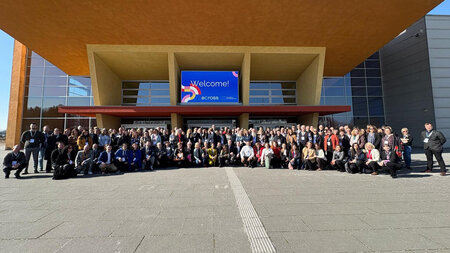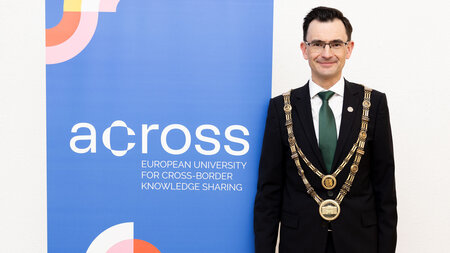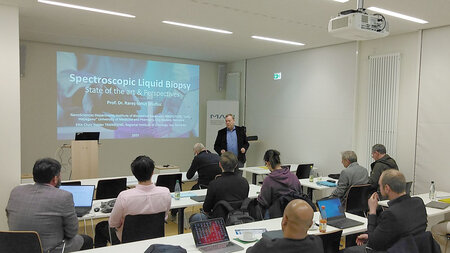Prof. Dr. Harald Kuhn takes over the management of Fraunhofer ENAS and a professorship at Chemnitz University of Technology
As of September 1, 2020, Prof. Dr. Harald Kuhn takes over the management of the Fraunhofer Institute for Electronic Nano Systems ENAS in Chemnitz and a professorship at Chemnitz University of Technology, which has been rededicated from "Microtechnology" to "Smart Systems Integration."
-

Prof. Dr. Harald Kuhn takes over the management of Fraunhofer ENAS and a professorship at Chemnitz University of Technology as of September 1, 2020. Photo/Assembly: private (Prof. Dr. Harald Kuhn)/Jacob Müller
Joint press release from the Fraunhofer-Gesellschaft and Chemnitz University of Technology
The particular strength of the Fraunhofer Institute for Electronic Nano Systems ENAS lies in the development of smart systems for various applications. Chemnitz University of Technology has also dedicated itself to this topic with its core competence Materials and Smart Systems. Smart Systems combine electronic components, micro and nano sensors and actuators with interfaces for communication and a self-sufficient energy supply. The systems are increasingly equipped with the ability to pre-evaluate data, detect errors and thus prepare decisions on the one hand, and to address and identify each other and work in consortia on the other. They are the key to digitization and the Internet of Things and are used in various areas. The design, integration and technology for the realization of such systems require novel approaches and present new challenges for interdisciplinary research. Under the leadership of Prof. Dr. Harald Kuhn, this research and development topic will be expanded and reliably continued in Chemnitz.
"Smart Systems are the future. Whether in the automotive industry, in medical technology or in the logistics sector - more and more smart systems are being used in many areas," explains Fraunhofer President Prof. Dr. Reimund Neugebauer. " Fraunhofer ENAS develops individual components for their production as well as entire system concepts and technologies for system integration - and transfers them into practical use. With the appointment of Prof. Dr. Harald Kuhn, Fraunhofer ENAS gains an experienced expert who combines practical orientation and interdisciplinarity in a future-oriented way. Prof. Dr. Kuhn can draw on many years of management expertise in the industry and will accompany customer projects from the idea to the design, technology development and implementation to the tested prototype." Prof. Dr. Harald Kuhn succeeds Prof. Dr. Thomas Otto, who has provisionally headed Fraunhofer ENAS since May 2016 and now wants to devote himself more to the research in the field of microtechnology. "I would like to take this opportunity to express my sincere thanks on behalf of the entire Fraunhofer Executive Board to Prof. Dr. Otto, particularly for his intense commitment as acting director and his outstanding work," Prof. Dr. Neugebauer continued.
"The appointment of Prof. Dr. Harald Kuhn will not only strengthen the university’s core competence 'Materials and Intelligent Systems' but also contribute significantly to the development of Chemnitz as a location for science and business," said Prof. Dr. Gerd Strohmeier, President of Chemnitz University of Technology. At the same time, the close ties between the Fraunhofer-Gesellschaft and Chemnitz University of Technology will continue to be intensified by the joint appointment. "I am very pleased that after the surprising and tragic death of Prof. Dr. Thomas Geßner as well as the provisional leadership of Prof. Dr. Thomas Otto, both the head of Fraunhofer ENAS and the professorship of our Faculty of Electrical Engineering and Information Technology, which in the meantime has been rededicated from 'Microtechnology' to 'Smart Systems Integration,' could be filled with Prof. Dr. Kuhn," continued the President who also thanked Prof. Dr. Otto very much for his relentless commitment.
Both, Fraunhofer ENAS and Chemnitz University of Technology are integrated in various networks locally, regionally, nationwide, EU and worldwide, including the Smart System Campus Chemnitz, Smart Systems HUB, Silicon Saxony, Biosaxony, IVAM, power centers, the Research Factory Microelectronics. "I am looking forward to actively developing the ecosystem of both research institutions. We will continue to be a reliable partner in the future and will increasingly use our innovative power to strengthen the economy in Germany and Europe," explains Prof. Dr. Harald Kuhn. "The current global situation shows us how important digitization is. Consequently, we will consistently continue our work on new technologies, components and systems such as integration technologies, the use of nanostructures in new sensor and actuator systems but also work on extended reliability concepts and supplement them with innovative approaches, in the area of data analysis with artificial intelligence or system security," continues Prof. Dr. Kuhn.
In order to strengthen Germany as a business location, the industry needs young scientists who are trained close for future tasks. Prof. Dr. Kuhn already supervised several bachelor and master theses in industry every year.
About Prof. Dr. Harald Kuhn
Prof. Dr. Harald Kuhn was last employed as a director at Infineon Technologies AG in Regensburg. There he headed the department of Automation & Equipment Technology.
He studied materials science at the Friedrich-Alexander University Erlangen-Nuremberg and started in 1996 as a development engineer for SiC crystal growth in the Research & Development department of Siemens AG. At the same time he received his doctorate at the University of Erlangen-Nuremberg.
Prof. Dr. Harald Kuhn has more than 20 years of experience in the semiconductor industry and has held various management positions at Infineon and Siemens. In his last position, he was responsible for the development of differentiating special equipment as well as the automation/I4.0 of backend sites with worldwide teams. His high methodical competence in developing innovative, modularized and scalable concepts was the basis for a successful worldwide productive implementation. In his function, Prof. Dr. Kuhn was a leader in innovation (e.g. Artificial Intelligence; IIoT) and its productive implementation. His international experience, especially in Asia, completes his profile.
The Fraunhofer-Gesellschaft, based in Germany, is the world's leading organization for application-oriented research. With its focus on future-relevant key technologies and on the exploitation of the results in business and industry, it plays a central role in the innovation process. As a signpost and source of inspiration for innovative developments and scientific excellence, it contributes to shaping our society and our future. Founded in 1949, the organization currently operates 74 institutes and research facilities in Germany. Around 28,000 employees, most of whom have a degree in the natural sciences or engineering, generate an annual research volume of 2.8 billion euros. Of this, 2.3 billion euros are spent on contract research.
Chemnitz University of Technology is a cosmopolitan university with strong regional, national and international networks. It is home to approximately 10,000 students from around 100 countries. With about 2300 employees in science, technology and administration, Chemnitz University of Technology is an important source of inspiration in the region. It sees itself as a university with a family flair, whose members and associates meet at eye level. Chemnitz University of Technology sees itself as an innovation driver in dealing with priority future tasks. Against the background of global change and demographic development, progressive solutions are required that are characterized by sustainability, interdisciplinarity and social benefits. To this end, Chemnitz University of Technology has defined the three core competencies "Materials and Intelligent Systems,” "Resource-efficient Production and Lightweight Construction" and "Man and Technology" in research and teaching.
(Author: Matthias Fejes / Translation: Chelsea Burris)
Matthias Fejes
03.09.2020





